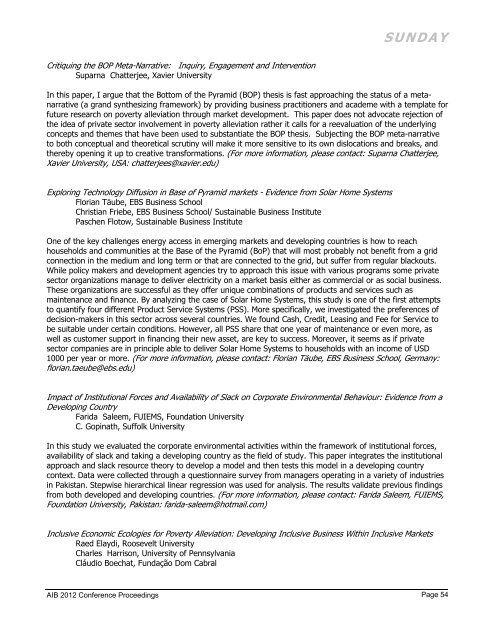AIB 2012 Conference Proceedings - Academy of International ...
AIB 2012 Conference Proceedings - Academy of International ...
AIB 2012 Conference Proceedings - Academy of International ...
You also want an ePaper? Increase the reach of your titles
YUMPU automatically turns print PDFs into web optimized ePapers that Google loves.
SUNDAY<br />
Critiquing the BOP Meta-Narrative: Inquiry, Engagement and Intervention<br />
Suparna Chatterjee, Xavier University<br />
In this paper, I argue that the Bottom <strong>of</strong> the Pyramid (BOP) thesis is fast approaching the status <strong>of</strong> a metanarrative<br />
(a grand synthesizing framework) by providing business practitioners and academe with a template for<br />
future research on poverty alleviation through market development. This paper does not advocate rejection <strong>of</strong><br />
the idea <strong>of</strong> private sector involvement in poverty alleviation rather it calls for a reevaluation <strong>of</strong> the underlying<br />
concepts and themes that have been used to substantiate the BOP thesis. Subjecting the BOP meta-narrative<br />
to both conceptual and theoretical scrutiny will make it more sensitive to its own dislocations and breaks, and<br />
thereby opening it up to creative transformations. (For more information, please contact: Suparna Chatterjee,<br />
Xavier University, USA: chatterjees@xavier.edu)<br />
Exploring Technology Diffusion in Base <strong>of</strong> Pyramid markets - Evidence from Solar Home Systems<br />
Florian Täube, EBS Business School<br />
Christian Friebe, EBS Business School/ Sustainable Business Institute<br />
Paschen Flotow, Sustainable Business Institute<br />
One <strong>of</strong> the key challenges energy access in emerging markets and developing countries is how to reach<br />
households and communities at the Base <strong>of</strong> the Pyramid (BoP) that will most probably not benefit from a grid<br />
connection in the medium and long term or that are connected to the grid, but suffer from regular blackouts.<br />
While policy makers and development agencies try to approach this issue with various programs some private<br />
sector organizations manage to deliver electricity on a market basis either as commercial or as social business.<br />
These organizations are successful as they <strong>of</strong>fer unique combinations <strong>of</strong> products and services such as<br />
maintenance and finance. By analyzing the case <strong>of</strong> Solar Home Systems, this study is one <strong>of</strong> the first attempts<br />
to quantify four different Product Service Systems (PSS). More specifically, we investigated the preferences <strong>of</strong><br />
decision-makers in this sector across several countries. We found Cash, Credit, Leasing and Fee for Service to<br />
be suitable under certain conditions. However, all PSS share that one year <strong>of</strong> maintenance or even more, as<br />
well as customer support in financing their new asset, are key to success. Moreover, it seems as if private<br />
sector companies are in principle able to deliver Solar Home Systems to households with an income <strong>of</strong> USD<br />
1000 per year or more. (For more information, please contact: Florian Täube, EBS Business School, Germany:<br />
florian.taeube@ebs.edu)<br />
Impact <strong>of</strong> Institutional Forces and Availability <strong>of</strong> Slack on Corporate Environmental Behaviour: Evidence from a<br />
Developing Country<br />
Farida Saleem, FUIEMS, Foundation University<br />
C. Gopinath, Suffolk University<br />
In this study we evaluated the corporate environmental activities within the framework <strong>of</strong> institutional forces,<br />
availability <strong>of</strong> slack and taking a developing country as the field <strong>of</strong> study. This paper integrates the institutional<br />
approach and slack resource theory to develop a model and then tests this model in a developing country<br />
context. Data were collected through a questionnaire survey from managers operating in a variety <strong>of</strong> industries<br />
in Pakistan. Stepwise hierarchical linear regression was used for analysis. The results validate previous findings<br />
from both developed and developing countries. (For more information, please contact: Farida Saleem, FUIEMS,<br />
Foundation University, Pakistan: farida-saleem@hotmail.com)<br />
Inclusive Economic Ecologies for Poverty Alleviation: Developing Inclusive Business Within Inclusive Markets<br />
Raed Elaydi, Roosevelt University<br />
Charles Harrison, University <strong>of</strong> Pennsylvania<br />
Cláudio Boechat, Fundação Dom Cabral<br />
<strong>AIB</strong> <strong>2012</strong> <strong>Conference</strong> <strong>Proceedings</strong><br />
Page 54

















